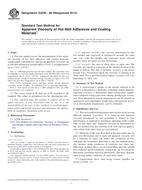Potřebujeme váš souhlas k využití jednotlivých dat, aby se vám mimo jiné mohly ukazovat informace týkající se vašich zájmů. Souhlas udělíte kliknutím na tlačítko „OK“.
ASTM D3236-88(2014)
Standard Test Method for Apparent Viscosity of Hot Melt Adhesives and Coating Materials
Automaticky přeložený název:
Standardní zkušební metoda pro zdánlivé viskozity tavných lepidel a nátěrových hmot
NORMA vydána dne 1.5.2014
Informace o normě:
Označení normy: ASTM D3236-88(2014)
Poznámka: NEPLATNÁ
Datum vydání normy: 1.5.2014
Kód zboží: NS-22957
Počet stran: 8
Přibližná hmotnost: 24 g (0.05 liber)
Země: Americká technická norma
Kategorie: Technické normy ASTM
Anotace textu normy ASTM D3236-88(2014) :
Keywords:
adhesives, apparent viscosity, coating materials, hot melt adhesives, viscosity, ICS Number Code 25.220.60 (Organic coatings), 83.180 (Adhesives)
Doplňující informace
| Significance and Use | ||
|
5.1 This test method distinguishes between hot melts having different apparent viscosities. It is believed that apparent viscosity determined by this procedure is related to flow performance in application machinery operating under conditions of low shear rate. Apparent viscosity as determined by this test method may not correlate well with end-use applications where high shear rates are encountered. 5.2 Materials of the type described in this procedure may be quite non-Newtonian and as such, the apparent viscosity will be a function of shear rate under the conditions of test. Although the viscometer described in this test method generally operates under conditions of relatively low shear rate, differences in shear effect can exist depending upon the spindle and rotational speed conditions selected for the test program. Maximum correlation between laboratories, therefore, depends upon testing under conditions of equivalent shear. 5.3 Approximate shear rates using various spindles are shown in Table A1.1. |
||
| 1. Scope | ||
|
1.1 This test method covers the determination of the apparent viscosity of hot melt adhesives and coating materials compounded with additives and having apparent viscosities up to 200 000 millipascal second (mPa·s) (Note 3) at temperatures up to 175°C (347°F). Note 1: Although precision has not been studied, this
procedure may be adaptable to viscosities higher than the present
200 000-mPa·s limit and temperatures above 175°C (347°F). Equipment
described in this test method permits testing of materials having
viscosities as high as 16 × 106 mPa·s and provides
temperatures up to 260°C (500°F).
Note 2: For petroleum waxes and their blends having apparent
viscosities below 15 mPa·s, Test Method D445 is especially applicable.
Note 3: One pascal second (Pa·s) = 1000 centipoise (CP); one
millipascal second = one centipoise.
1.2 The values stated in SI units are to be regarded as the standard. The values in parentheses are for information only. 1.3 This standard does not purport to address all of the safety concerns, if any, associated with its use. It is the responsibility of the user of this standard to establish appropriate safety and health practices and determine the applicability of regulatory limitations prior to use. |
||
| 2. Referenced Documents | ||
|
Odebírejte informace o nově vydaných normách ZDARMA:
Chcete pravidelně odebírat informace o nově vycházejících normách z celého světa a to zcela zdarma?
Přihlašte se k odběru. Vše je velice jednoduché a absolutně ZDARMA.
Na výběr máte vydavatele z celého světa.




 Cookies
Cookies
